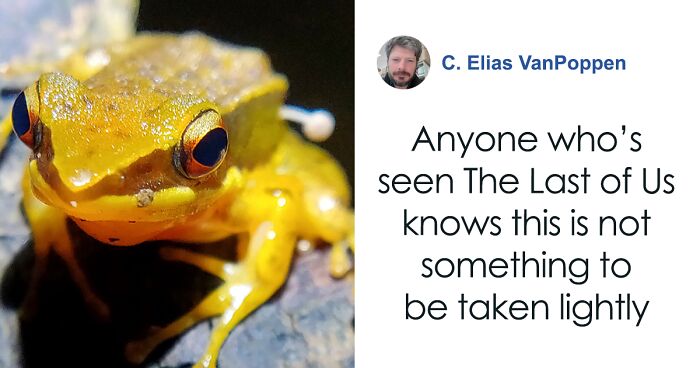
Scientists Baffled By Unprecedented Sight Of Living Frog With Mushroom Sprouting Out Of Its Side
In June 2023, a group of naturalists noticed an odd detail in one of the frogs they found during their trip to observe amphibians and reptiles at a roadside pond in Karnataka, southern India.
Perched on a twig, a live golden-backed frog presented researchers with an unexpected sight: a tiny mushroom sprouting out of its side.
“When I first observed the frog with the mushroom, I was amazed and intrigued by the sight,” Lohit Y T, a rivers and wetlands specialist with World Wildlife Fund-India in Bengaluru, told CNN. Lohit was among the researchers who discovered the frog.
A golden-backed frog with a tiny mushroom sprouting out of its flank presented researchers with a baffling, unprecedented sight
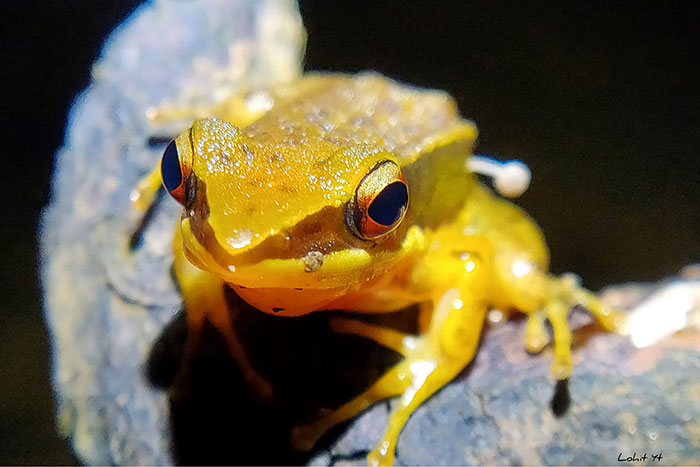
Image credits: Lohit Y T
“My thought was to document it, as this phenomenon is something we have never heard of. We just wanted this to be a rare incident and not a dangerous phenomenon for the frog.”
The miniature frogs, which grow to be only up to 2.9 inches (7.4 centimeters) in length, are abundant in the southwestern Indian states of Karnataka and Kerala.
Though the species’ scientific name is Hylarana intermedia, they’re commonly known as the Rao’s intermediate golden-backed frog.
As Lohit described, the group didn’t touch the animal when they found it, and they didn’t collect it, either, so the fate of the amphibian and the cause of the phenomenon remained unknown.
The frogs are abundant in the southwestern Indian states of Karnataka and Kerala, but scientists had never seen one with a mushroom emerging from its side
Image credits: Lohit Y T
Lohit and his colleagues did, however, publish a note on their discovery in January 2024 in the journal Reptiles and Amphibians to inform biologists of their unprecedented finding.
Through pictures, mycologists later identified the mushroom growing out of the frog’s left flank as a common bonnet, part of the Mycena genus, a type of fungi that mostly grows on rotting wood from dead trees.
Mycena is a saprotrophic decomposer, which means that it typically gets its nutrients from dead or decaying organic matter. Still, a 2023 study found it could also evolve to thrive on living plants.
The 2023 study suggested that the Mycena fungus could develop to have a symbiotic relationship with living plants or trees. That is, the fungi would both take nutrients from and transfer them to the plant host in a mutually beneficial arrangement.
Image credits: Lohit Y T
Alyssa Wetterau Kaganer, a postdoctoral associate in the Department of public and Ecosystem Health at the Cornell University College of Veterinary Medicine, suggested the fascinating discovery could be a manifestation of the adaptive capabilities of the mushroom.
“Fungi are dynamic organisms that adapt to changes in their environment, and with exposure to new potential hosts in different environments or climates they may grow in places we hadn’t previously expected,” she explained.
As for the fate of the frog, Kaganer says “an otherwise healthy frog may be able to withstand mild colonization of its skin by this fungus without any adverse health effects.”
However, the expert can’t draw conclusions without a study of the animal. If the Mycena fungi were to “grow extensively on the skin or burrow within the animal’s body, the animal may develop signs of a fungal disease,” she added.
“My thought was to document it, as this phenomenon is something we have never heard of,” Lohit Y T, a rivers and wetlands specialist who witnessed the animal, said
Image credits: Lohit Y T
As fungal infections are common among frogs, scientists don’t rule out the possibility of unknown fungus-frog interactions.
Karthikeyan Vasudevan, chief scientist for the Laboratory for the Conservation of Endangered Species at the Centre for Cellular and Molecular Biology in Telangana, India, has put forward another hypothesis: that the live mushroom didn’t grow directly from the frog’s tissue but from wood.
“One of the possibilities is that there is a small piece of woody debris under the skin of the frog after it got lodged in the skin and it has sprouted a mushroom from it”, she said.
Cases of chytridiomycosis— a deadly fungal infection that affects over 700 species of amphibians worldwide—are surging in India, and have been observed in low levels in all the frog hotspots across the country, the study’s authors noted.
While the fungus species that causes chytrid disease isn’t related to the Mycena mushroom seen in the frog, Kaganer believes it possible “that a frog with Mycena might have altered susceptibility to a chytrid infection.”
Scientists can’t even agree on whether the pictures show a Mycena mushroom, or if the growth is even a mushroom
Image credits: Lohit Y T
The authors will visit the roadside pond again during the next monsoon season, when the weather is warm and rainy and the frogs are most abundant, in the hopes of catching another sight of the intriguing yet elusive amphibian.
“If we manage to find it, it’ll be great,” Lohit said. “The spot has been frequented by many enthusiasts and experts alike.
“It would be great if some researcher gets their hands on it and can further the investigation, but again, it’s all highly unlikely to happen.”
The golden-backed frog’s case is so rare that some researchers don’t even dare to draw conclusions about the fungus species attached to it, stating they need more than a photo to identify it.
Some, like fungal ecologist Sydney Glassman, aren’t convinced that the growth is even a mushroom.
People reacted to the intriguing sight with some pretty funny comparisons
19Kviews
Share on FacebookSigh. Ok, old, highly experienced FIELD biologist/researcher here. They've never seen this before!?!? Gasp. They've not really been looking. I've seen many frogs- attacked by every kind of tiny bug/parasite you can name. Most of them die soon, so you have to be in the field, truly looking to catch it. My observation, as a behavioral scientist? Increasingly, "scientists", who have lived 99.7% of their lives in cities - are encountering things "never seen before!" which, in fact, farmers and shepherds saw and and understood just fine- 10s of thousands of years ago. They'll never know...
Curious if you've seen a mushroom, though? They do mention frogs are prone to fungal diseases, but it sounds like these researchers hadn't heard of specifically a mushroom growing on one.
Load More Replies...Sigh. Ok, old, highly experienced FIELD biologist/researcher here. They've never seen this before!?!? Gasp. They've not really been looking. I've seen many frogs- attacked by every kind of tiny bug/parasite you can name. Most of them die soon, so you have to be in the field, truly looking to catch it. My observation, as a behavioral scientist? Increasingly, "scientists", who have lived 99.7% of their lives in cities - are encountering things "never seen before!" which, in fact, farmers and shepherds saw and and understood just fine- 10s of thousands of years ago. They'll never know...
Curious if you've seen a mushroom, though? They do mention frogs are prone to fungal diseases, but it sounds like these researchers hadn't heard of specifically a mushroom growing on one.
Load More Replies...
 Dark Mode
Dark Mode 

 No fees, cancel anytime
No fees, cancel anytime 






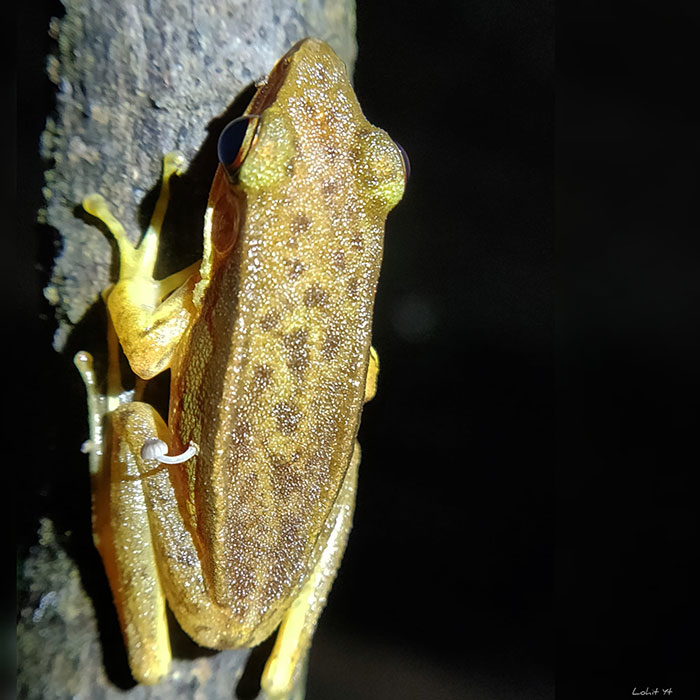
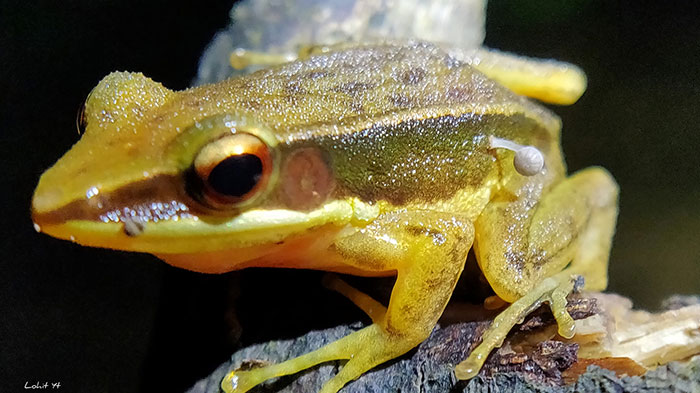
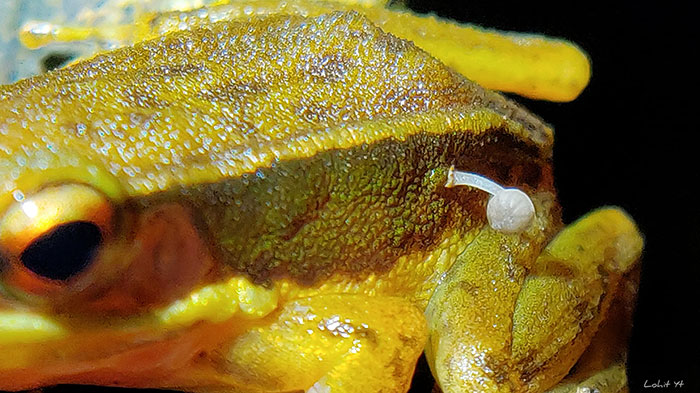
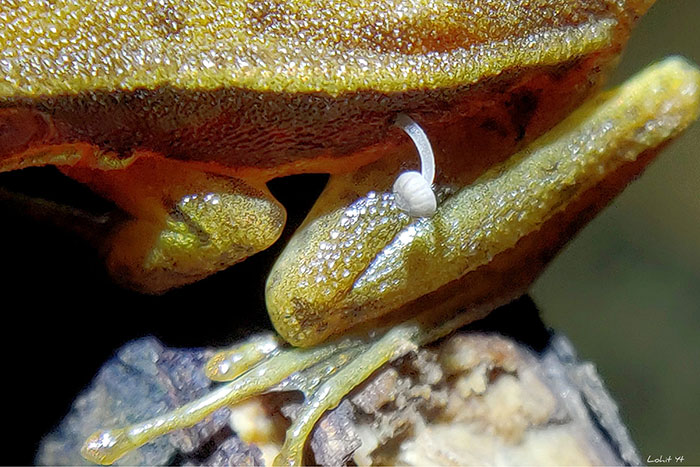






















































48
7